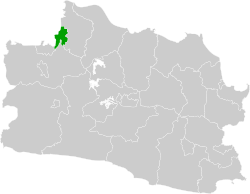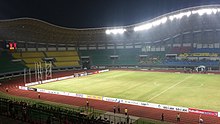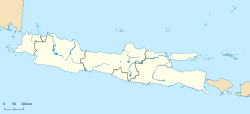Bekasi
Bekasi | |
|---|---|
| City of Bekasi Kota Bekasi | |
 From top to mid-left in clockwise sequence; Top: Patriot Candrabhaga Stadium, Mid-right: Bekasi Junction, Bottom left and right: Malls and its surrounding skyline, Mid-left: Pekayon City. | |
| Motto(s): Cerdas, Sehat dan Ihsan (Indonesian) (Smart, Healthy and Charitable) | |
 Location within West Java | |
| Coordinates: 6°14′06″S 106°59′32″E / 6.2349°S 106.9923°E | |
| Country | |
| Province | |
| Government | |
| • Mayor | Rahmat Effendi[1] |
| • Vice Mayor | Tri Adhianto |
| Area | |
| • Total | 210.49 km2 (81.27 sq mi) |
| Elevation | 11–81 m (36–265 ft) |
| Population (2014) | |
| • Total | 2,663,011 |
| • Density | 13,000/km2 (33,000/sq mi) |
| Time zone | UTC+7 (Indonesia Western Time) |
| Area code | (+62) 21 |
| License plate | B |
| Website | www |
Bekasi (Malay pronunciation: [ˈbɛkasi]) is a city in West Java, Indonesia, located on the eastern border of Jakarta within the Jakarta metropolitan area. It serves as a commuter city for Jakarta, although it has notable trade, business and processing industries. With 2.66 million inhabitants in an area of 210.49 square kilometres (81.27 sq mi), Bekasi is the third most populous city proper in Indonesia, but since it is a part of Jakarta urban agglomeration, Bandung is widely known as the county's third largest city.[2] The borders for this city are Bekasi Regency at the north and east, Bogor Regency and Depok City at the south, as well as East Jakarta at the west. It is Indonesia's most populated incorporated suburban city to Jakarta, and one of the most populated worldwide, but still trails the likes of Incheon and Yokohama. The large number of multinational companies, has apparently attracted a lot of expatriates (mainly Japanese and Korean) to settle in Bekasi.[3]
As a dormitory city, many middle-up satellite cities have been developed in Bekasi,[4] complete with their own shopping malls, schools, hospitals, club houses, water park, and shuttle bus services to central Jakarta.
Bekasi is one of the oldest cities in Indonesia, and has a history of being the capital city of the Kingdom of Tarumanagara. At that time, the name of Bekasi was Dayeuh Sundasembawa. The earliest evidence of its existence dates from the 5th century according to the Tugu inscription.[5]
Economy
Bekasi has already grown to become one of the center of growth in Indonesia. The city has accounts for 2.11% of total national GDP.[6] Recently, many foreigners (most of Korean, Japanese and Chinese) have set up their business to take advantage of its dynamism and boost its economy. Bekasi's economy was mainly based on service and manufacture.
Commerce
Bekasi is one of the most promising property markets in Indonesia, and several high-value developments have transformed its property market. Many of country's big property developers are building apartments, hotels, and shopping malls in the city. In recent years, some residences have developed along the Jatiwarna/Jatibening — East Bekasi toll highway, further to Cibatu in Bekasi Regency. These include Harapan Indah, Summarecon Bekasi, Kemang Pratama and Grand Galaxy City.
Prime business and commercial centers in the western part of city. There are some of financial, restaurants and shopping centers along Jalan Ahmad Yani, Jalan Sudirman, Jalan KH. Noer Alie as well as Harapan Indah Boulevard. Bekasi has the upper-middle class shopping malls which are consist of high-street brands such as Uniqlo, Marks & Spencer, H&M and Cotton On. The largest shopping center is Grand Metropolitan with over 125,000 m² of floor space.[7] Other shopping centers include Metropolitan Mall, Summarecon Mal Bekasi, Mal Ciputra Cibubur, Mega Bekasi Hypermall, Grand Galaxy Park, Grand Mall, Blu Plaza, BTC Mall, GP Mall, Bekasi Cyber Park, Plaza Pondok Gede, Revo Town and Lagoon Avenue. Many hotels developed in Bekasi, such as Santika, Horison, Harris, Aston Imperial, Amaris, Amaroossa, and Tune Hotel.
Industry
In addition to its numerous residential areas, there are several important industrial areas in the outskirts of Bekasi. Most of them are in Bekasi Regency, rather than the city limits. These include the Jababeka, MM 2100, Bekasi International Industrial Estate (BIIE), Delta Silicon Industrial Park, Lippo Cikarang, Greenland International Industrial City (GIIC) and East Jakarta Industrial Park (EJIP) districts. Many large companies, such as Honda, LG, Converse and Samsung, have factories in Bekasi. Nowadays some 4,000 companies are operating in Bekasi and surrounding areas. It is estimated that approximately 1,000 expatriate workers[8] and over 500,000 laborers are working in the area.
Hankook Tire of South Korea is building a US$353 million tire plant in Bekasi and started production in 2014.[9]
Infrastructure

The development of large scale residential areas and industrial parks in Bekasi has been induced by infrastructure development, especially roads, highways and railways.
Road and highway
Bekasi is connected by the Trans-Java Highway, the main road across Java. There are three highways connections from the Jabodetabek urban area. The Jakarta–Cikampek Toll Road, which has three exits in Bekasi; the Jakarta Outer Ring Road, which provides access to Tangerang, Jakarta and Bogor as well as the new Bekasi-Cawang-Kampung Melayu Toll Road. In 2019, Jakarta-Cikampek elevated toll road will operate to ease traffic in current toll road between Cikunir to West Karawang with a total length of 36.4 kilometers.[10] Owing to its location as a satellite city of Jakarta, heavy rush hour traffic jams have become common on the roads between East Jakarta and Bekasi.
| KM | Toll Road | Toll Gate | Destination |
|---|---|---|---|
| 08 | Jakarta–Cikampek Toll Road | Jatibening | Jatibening, Jatiwaringin, Cikunir |
| 12 | Bekasi Barat | Kayuringin, Pekayon, Summarecon Bekasi | |
| 16 | Bekasi Timur | Margahayu, Bulak Kapal, Bantar Gebang | |
| 37 | Jakarta Outer Ring Road | Jatiwarna | Jatiwarna, Kranggan, Pondok Gede |
| 41 | Jatiasih | Jatiasih, Cikunir, Jatimekar | |
| 47 | Kalimalang | Kranji, Jakasampurna, Bintara Jaya | |
| 49 | Bintara | Bintara, Bintara Jaya, Harapan Baru | |
| 13 | Bekasi-Cawang-Kampung Melayu Toll Road | Jakasampurna | Jakasampurna, Jakasetia, Grand Galaxy City |
Railway
The government is currently constructing a double track railway connecting Manggarai to Cikarang, which would be finished around the late 2018.[11] Beside a double track railway, the government also building a 17.9 km light rail transit line connecting East Bekasi-Cawang-Dukuh Atas across Greater Jakarta.[12]
Transportation

At present, rapid transit in Bekasi across Greater Jakarta consists of a BRT TransJakarta and a commuter rail KRL Jabodetabek. KRL Jabodetabek serves from Bekasi to Jakarta Kota via Pasar Senen/Manggarai vice versa. Another train service is airport train service connecting the Soekarno-Hatta International Airport to Bekasi.
The TransJakarta and the Transjabodetabek premium serves commuters from Harapan Indah, Summarecon Bekasi, Bulak Kapal, and Jatiwarna, as well as the feeder buses from Kemang Pratama and Grand Galaxy City to Jakarta city center. The Trans Patriot will operate two routes within the city. Damri shuttle bus service is available from the Soekarno–Hatta International Airport to Kayuringin and Harapan Indah. Taxis are widely available. The primary means of public transportation is by minibus, called Koasi. They serve certain routes throughout the city.
The main bus terminal is Terminal Bekasi, located in East Bekasi. The other terminals are Pondok Gede, Harapan Indah and Kayuringin.
Demographics
The latest official (2014) of Bekasi population was 2,663,011, giving a density of 11,900/km2 (31,000/sq mi). Bekasi is inhabited by many different ethnic groups, mostly Betawi and Javanese descent. Sundanese are the largest minority as well as other minorities include Minangkabau, Bataks, and Chinese. With Indonesia introducing identity cards as of 2011, and newcomers flood the city trying to blend in with returnees following major holidays, DKI Jakarta has clamped down on this practice with police questioning and tougher residency requirements, leading returnees to increasingly try their luck in Bekasi. However, as of 2017, crowded Bekasi has begun similar tactics to stem the flow of new arrivals contributing to uncontrolled population growth.
Most citizens in Bekasi adhere to Islam. Other religions include Christianity (Roman Catholicism and Protestantism), Hinduism, Buddhism, and Confucianism.
Sport

Bekasi is the home base of the soccer team Persija Jakarta, with Patriot Chandrabhaga Stadium being the home stadium of the club.
Administration

Bekasi City is divided into 12 districts ('kecamatan'):
| District | Population (2014 census) |
|---|---|
| Jatisampura | 129,036 |
| Pondok Gede | 282,817 |
| Pondok Melati | 147,674 |
| Jatiasih | 230,143 |
| Bantar Gebang | 112,167 |
| Mustika Jaya | 214,071 |
| East Bekasi | 258,391 |
| Rawalumbu | 241,859 |
| South Bekasi | 221,519 |
| West Bekasi | 293,144 |
| Medan Satria | 178,612 |
| North Bekasi | 353,578 |
In popular culture
- Chairil Anwar's poem Krawang-Bekasi (1948).
- Pramoedya Ananta Toer's novel Di Tepi Kali Bekasi (1951) is set mainly in Bekasi.
Local Media
Kalimalang (Greater Bekasi Media)
People from Bekasi
Famous people from Bekasi include:
- Adixi Lenzivio: footballer for Persija Jakarta
- Luitenant der Chinezen Khouw Tian Sek: landlord, patriarch of the Khouw family of Tamboen
- Shella Devi Aulia: badminton player
- S. K. Trimurti: government minister, Independence activist, writer and journalist
- Tutty Alawiyah: government minister and women's rights advocate
References
- ^ "Tomorrow Rahmat Effendi officially mayor". viva.co.id. May 2, 2012.
- ^ bekasikota.bps.go.id http://bekasikota.bps.go.id/linkTableDinamis/view/id/9 Sensus Penduduk Kota Bekasi 2014
- ^ Peter J. Katzenstein, Takashi Shiraishi; Beyond Japan: The Dynamics of East Asian Regionalism; 2006
- ^ http://properti.kompas.com Pasar "Middle-up" Bekasi Menggiurkan, Rumah Harga Rp 800 Juta Paling Dicari!
- ^ http://www.bekasikota.go.id Sejarah Kota Bekasi
- ^ Jefriando, Maikel. "Ekonomi Jakarta Digabung Bekasi, Bogor, dan Tangerang Capai Rp 2.490 T".
- ^ http://www.rumah.com Mal Grand Metropolitan Bekasi Resmi Dibuka
- ^ http://www.thejakartapost.com Approximately Cikarang residential place of choice for expatriates
- ^ "Archived copy". Archived from the original on 2011-01-24. Retrieved 2011-01-24.
{{cite web}}: Unknown parameter|deadurl=ignored (|url-status=suggested) (help)CS1 maint: archived copy as title (link) - ^ https://www.republika.co.id/berita/en/national-politics/18/09/12/pewnut414-50-percent-of-jakartacikampek-elevated-toll-road-completed 50 percent of Jakarta-Cikampek elevated toll road completed
- ^ http://www.thepresidentpost.com Minister Jonan: Manggarai-Cikarang Double Track Project to Be Finished in 2017
- ^ http://www.cnnindonesia.com Bos Adhi Karya yakin Proyek LRT Bantu Kurangi Macet Jakarta
External links
 Bekasi travel guide from Wikivoyage
Bekasi travel guide from Wikivoyage- Bekasi local government website Template:Id icon




